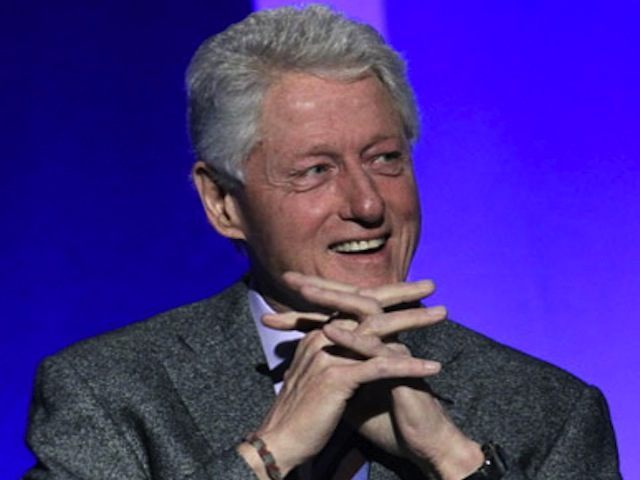LONDON, United Kingdom – Former U.S. President Bill Clinton was in London yesterday evening to give the keynote address at the Conference On Inclusive Capitalism. The most interesting thing about his 40 minute speech – “What it’s All About – Actions for the Future” – was not what he had to say about Inclusive Capitalism, but rather what the speech told us about how a future Clinton Presidency would enact the ideology.
That’s not to say that President Clinton was anything other than the main attraction on the day. Arriving at London’s 600 year old Guildhall to attend the event, a group of middle-aged women was observed loitering by the roadside entrance. Questioned by Breitbart London the group gushingly confessed they were hoping to catch a glance of Clinton as he arrived (he had already been in the building for some time), with one explaining he was the “best President ever”, only to be corrected by another “…apart from Obama.”
Clinton’s ‘rock star’ status extended to his introduction to the stage, given by the Chairman & Co-Founder of the Coalition for Inclusive Capitalism, Lady Lynn Forester de Rothschild. Explaining that his attendance at the globally important conference rendered the event “iconic” she said:
“Who would have believed that 500 people would show up in London on a Friday night in June to hear a speech about capitalism? Maybe if we had called it ’50 Shades of Capitalism’, but no, we are here because we are about to hear one of the most generous and gifted men of his generation.”
Lady de Rothschild gave the first clue as to how a second Clinton White House would work when she noted that in a speech to bankers Hillary had favourably quoted Mark Carney, the Governor of the Bank of England, saying:
“Capitalism loses its sense of moderation when the belief in the power of the markets enters the realm of faith. Unchecked market fundamentalism can devour the social capital essential to the dynamism of capitalism itself.”
Opening his speech with references to the 800th anniversary of King John’s signing of Magna Carta, President Clinton noted that document had not marked the end of progress, saying: “there are no final victories of defeats in politics, you just have to keep at it.” He went on to identify what he saw as “the defining battle of the first half of the 21st century”, being “the battle between positive and negative forces of our interdependence.”
Describing the current era of interdependence as “pretty good for most of us” he warned it was nevertheless a “cause of new and painful vulnerabilities” in others. At one end of the spectrum he cited both the anti-union political establishment of Tennessee and free market fundamentalists who fear any rises to the minimum wage will bring the skies down on our heads. At the other more serious end he spoke of the “extreme examples of resentment” illustrated by the terror attacks in Tunisia, France and Kuwait on the same day as his speech. Both ends of the spectrum would, Clinton believes, reject Inclusive Capitalism.
The example of Tunisia was an interesting one. Clinton explained that Islamists had chosen to attack there because it is an example of a country where the Arab Spring works. Accepting that there is an authoritarian government he said that there are “enough of the makings of a proper economy” in Tunisia for the country to refuse to allow itself to collapse into an extremists’ playground. In Kuwait he said the attack on the Shiite mosque was intended to stop religious reconciliation between Kuwait’s majority Sunni population and its Shiite minority. Expanding on the point he said:
“You cannot hold an interdependent world together without inclusive politics, inclusive social policies and inclusive economics. You cannot have a society where people wake up every day full of resentment and of anger and bitterness, and a sense of disempowerment and victimhood, even if it’s justified. It will never work.”
So what solution does President Clinton (and by extension, Hillary Clinton) offer? Inclusive Capitalism. It is that which he credits for the success of Singapore, a country where in the early 1960s the annual income was US$900 but is now $55,000.
But what does Inclusive Capitalism actually mean? Conference literature explains:
“Inclusive Capitalism provides that firms should account for themselves, not just on the bottom line, but on environmental, social and governance metrics… Every firm has a license to operate from the society in which it trades. This is both a legally and socially defined license… Firms must contribute proportionately to the societies in which they operate. Without fairly contributing, firms free-ride on services that other people have paid for. Firms that practice unsustainable activities, disrespect their stakeholders and the communities in which they operate will find their licenses threatened, first by the engaged consumer, then by government. Firms practicing Inclusive Capitalism will see their license strengthened.”
Clinton also explained that his current role in life is not dissimilar to his vision. Having famously claimed to have been “dead broke” when he left the White House, he set out what he now does “for a living”:
“Basically…I just go around and kind of take money away from people who’ve got it and give it to people who don’t, a lot more like Robin Hood than King John, but I try to do it in a way that promotes empowerment.”
So there it is, the vision of Inclusive Capitalism and a blueprint for a second Clinton White House. Lady de Rothschild confessed in her introduction that she finds herself “in awe of [the Clintons’] generous hearts and their deep commitment to leaving the world a better place than where they found it. They have made a huge difference already and something tells me it ain’t over yet.”
America, you have been warned…

COMMENTS
Please let us know if you're having issues with commenting.